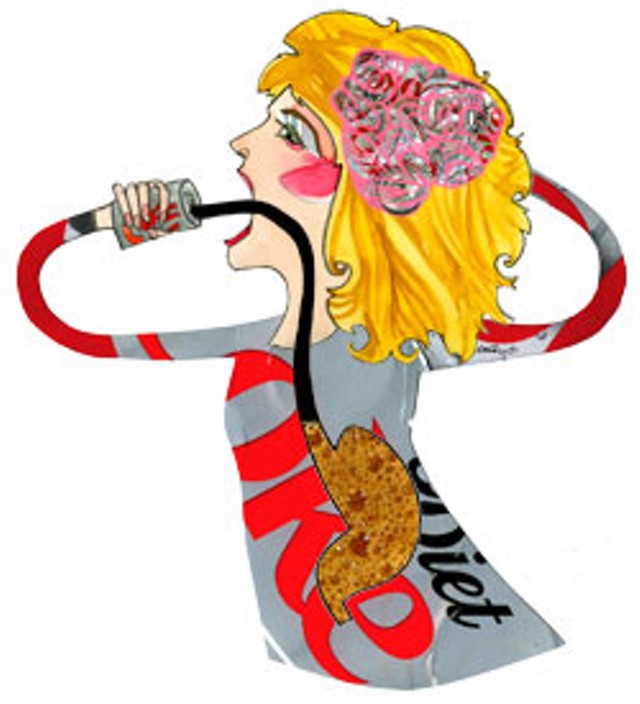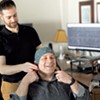Published January 21, 2009 at 6:28 a.m.
My name is Lisa and I’m an addict. A Diet Coke addict. I’ve been clean for four months now, after being hooked on the stuff since its 1982 debut. And before that, I drank its diet soda ancestor, Tab. I didn’t have a 12-can-a-day habit, or quaff it to the exclusion of water, as some Diet Coke devotees profess to do. But I drank it every day for decades, until September 15, 2008, when I put the last four bottles I had on my trainer’s desk at the gym with this note: I quit. Here are the rest of my drugs. Distribute or toss them as you see fit!
My addiction wasn’t exactly a dirty secret, and I had plenty of prominent company. A laundry list of celebs — famous and infamous — have publicly owned up to a serious habit. Bill Clinton and John Edwards; Donald Trump and Bernie Madoff; Harvey Weinstein and Victoria Beckham. Musicians specify backstage Diet Coke supplies in their contract riders, although my fellow addict from the ’80s, Elton John (who starred in Diet Coke ads), recently switched to water, according to his blog.
Although I also drank plenty of water, I usually chugged through a couple of two-liter bottles of Diet Coke per week. I never left the house without a small bottle (or two) in the car for an energy jolt as I went about my day. Except in the dead of winter, when the air temperature kept the soda properly chilled, a cooler always rested on the car floor next to me. I balked at paying the usurious gas station price for a hit . . . I mean, drink.
Going into a meeting? I was more likely to bring a Diet Coke with me than a water bottle. An interview for a story? The caffeine promised to keep me on my toes. Out on a late theater assignment? Downing one perked me up for the long drive home. I was used to a certain level of caffeine in my bloodstream, and as long as I didn’t drink too much late at night, it never interfered with sleep.
Most days, however, I work at home. And a tall glass, brimming with ice, stood by my computer as I clacked away at the keyboard. A bracing sip helped clear my mental palate. The need to refill an empty glass got me out of the chair to stretch and glance at the gorgeous view outside my windows in Grand Isle.
Dare I say that Diet Coke was my constant companion? My friend? But a friend I knew was really bad for me. Like the one at school who seduced you into doing evil things: smoking in the girls’ room, letting her cheat off your test, shoplifting a skirt you’d feel too guilty to ever wear. But hanging out with her was fun. I’d break off the friendship later. Maybe.
For decades, competing scientists have loudly debated Diet Coke’s artificial sweetener, aspartame (NutraSweet). Toxic! Safe! Poisonous! Harmless! I was convinced of its dangers. Aspartame has a short shelf life (note that diet soda always carries an expiration date) and is chemically unstable at temperatures equivalent to a hot summer day. Its opponents insist that digestion breaks down NutraSweet into a scary list of components, many of which are neurotoxins, including formaldehyde. The story of NutraSweet’s FDA approval in the early ’80s seemed to me a triumph of Reagan deregulation: Corporate profits took precedence over consumer safety. Saccharine’s risks were exaggerated to promote aspartame’s cause.
I avoided ingesting NutraSweet from any other source, carefully checked dates on bottles, and never left soda in a hot car. But I rationalized away my consumption of Diet Coke: It was my only vice. I don’t smoke or do drugs. I drink alcohol just a few times a year. My diet is free of junk food and red meat, and full of lean proteins, veggies and whole grains.
In fact, over the last few years I’ve shed 71 pounds — a huge chunk of the illness-related weight gain I’d been lugging around since my late twenties. The process has required tremendous focus and discipline. I work out religiously, and haven’t eaten anything remotely resembling an Oreo in years.
But the weight loss stalled about 18 months ago, 20-odd pounds short of the finish line. I ramped up the fitness routine and continued to lose inches, but not another ounce of weight. The needle on my frustration meter rose rapidly when the scale got stuck.
In the desperate search for a solution, I wondered about the effects of the aspartame on my body chemistry. Some studies suggest artificial sweeteners stimulate appetite, especially for sugars, and thus hinder weight loss. Could getting off Diet Coke break the maddening plateau? I was willing to try just about anything.
I thought drinking diet soda was helping me feel full. I had originally turned to Tab as a teen, recovering from a brush with anorexia but still zealously counting calories. The thought of wasting any of the day’s precious allotment on sugary soda was out of the question back then, even though the saccharine-sweetened Tab tasted pretty vile.
For much of 2008, I toyed with, and resisted, the idea of quitting. I enjoyed my habit, and resented feeling that I had to give it up. Others had been urging me to do so for a long time, which set off my oppositional instincts.
My mother had always thought excessive soda consumption was bad for me. But who listens to Mom (cue whining tone of voice), even if she’s usually right about, well, everything? My neurologist didn’t like how much I drank, either, warning that it could be exacerbating migraines. So what if he’d been right about other headache triggers?
The tipping point came in a post about artificial sweeteners on a blog I frequent. I casually mentioned my Diet Coke problem, and my friends — none of whom has ever met me, or even knows my real name — begged me to quit. They shared scary personal experiences, such as weight gain, sugar cravings and even seizures, that they felt were linked to Diet Coke, and deluged me with helpful suggestions, tips and links. I was moved by their genuine concern for my health. If these stranger-friends from Ireland and Kansas cared so much, then maybe I’d better just do it.
So I did. And quitting was harder than I expected. I was surprised at the intensity with which I reacted to behavioral signals: wanting a Diet Coke while I was prepping dinner, or when I woke up from a catnap. Just seeing others opening cans during a theater intermission actually made me salivate. At a wedding, six days into my soda sobriety, the nonalcoholic beverages chilled together in a giant trough. I dreaded having to plunge my arm past bobbing red-and-white cans to get a water bottle, and felt shaky doing it every time.
Since I wasn’t decaffeinating altogether, I didn’t expect to suffer physiological withdrawal. A cup of coffee in the morning and an occasional one of green tea during the day have replaced the missing milligrams of caffeine. So it was an unpleasant surprise to experience physical effects from NutraSweet detox.
Days Three and Four were the nastiest: They came with a headache unresponsive to big-gun migraine meds, and waves of nausea, wooziness and profound fatigue. The worse I felt, the more intensely I craved Diet Coke. But I realized that if getting it out of my system felt that bad, I really must have been poisoning myself. My resolve to stay clean strengthened.
That resolve ebbs at times, but I haven’t fallen off the wagon. Visual cues now trigger most cravings, such as seeing a towering glass of the stuff next to someone else’s computer on a TV show. The shiny ice. The caramel-chocolate color of the bubbly liquid. The glistening beads of condensation. My mouth waters at the sight.
I’ve upped my consumption of seltzer, so the zing of frosty carbonation remains part of my day. Handy cans now come with me on the road. Lime-flavored seltzer has a nice edge, although it lacks the bite (and caffeine) of Diet Coke’s chemical brew. My energy level doesn’t seem so dependent on that constant caffeine infusion, however. I rarely find myself reaching for a second cup of coffee during the day, whereas I used to need Diet Coke constantly.
The one huge disappointment: The scale hasn’t budged. So far, purging my system of Diet Coke’s toxic cocktail hasn’t helped with weight loss at all. Going soda-free has left me a bit healthier and happier, however, and more in control. I feel a new kinship with those who also drink seltzer or juice at a bar. Although we’re tempted by different liquid mistresses, we all know it takes work to resist their siren song.
More By This Author
Speaking of...
-

Q&A: Howard Fisher Delivers Meals on Wheels With a Side of Good Cheer
Dec 20, 2023 -

Video: Howard Fisher Delivers Meals on Wheels
Dec 14, 2023 -

'We Must Act Now': Burlington Council Passes Resolution on Drug Crisis, Public Safety
Oct 11, 2023 -

Q&A: Alexis Dexter Rescued 57 Shelter Cats During the July Flood
Sep 13, 2023 -

Video: Two Months After the Flood, Alexis Dexter Rebuilds Kitty Korner Café in Barre and Continues to Rescue Cats
Sep 7, 2023 - More »
Comments
Comments are closed.
From 2014-2020, Seven Days allowed readers to comment on all stories posted on our website. While we've appreciated the suggestions and insights, right now Seven Days is prioritizing our core mission — producing high-quality, responsible local journalism — over moderating online debates between readers.
To criticize, correct or praise our reporting, please send us a letter to the editor or send us a tip. We’ll check it out and report the results.
Online comments may return when we have better tech tools for managing them. Thanks for reading.














































